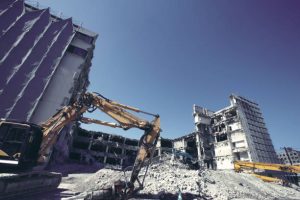 When it comes to commercial properties, owners and developers often face the decision of whether to pursue demolition or renovation. Both options have their pros and cons, and the choice ultimately depends on various factors such as the condition of the building, the project scope, and the potential return on investment. In this article, we will explore the differences between demolition and renovation, consider the cost implications of each option, and discuss the benefits and drawbacks of choosing one over the other. By the end, you will have a better understanding of which approach is the most suitable for your commercial construction project.
When it comes to commercial properties, owners and developers often face the decision of whether to pursue demolition or renovation. Both options have their pros and cons, and the choice ultimately depends on various factors such as the condition of the building, the project scope, and the potential return on investment. In this article, we will explore the differences between demolition and renovation, consider the cost implications of each option, and discuss the benefits and drawbacks of choosing one over the other. By the end, you will have a better understanding of which approach is the most suitable for your commercial construction project.
Understanding the Difference between Demolition and Renovation
Before we delve into the decision-making process, let’s clarify the distinction between demolition and renovation. Demolition involves completely tearing down a building and starting from scratch, while renovation refers to making significant changes and improvements to an existing structure. The scope of the project is the primary factor that sets these two options apart. Renovations typically involve minor aesthetic alterations to specific areas of the building, such as lobbies and restrooms, and can often be carried out while tenants continue to occupy the premises. On the other hand, demolition and subsequent reconstruction are necessary for larger-scale projects that require the expertise of demolition specialists and a complete overhaul of the property. In such cases, tenants are usually required to vacate during the construction process.
Considering Cost Factors for Demolition and Renovation
Cost is a crucial consideration when deciding between demolition and renovation. In many cases, remodeling a room or making minor modifications is more cost-effective than a complete reconstruction. If your project involves only minor changes that do not impact the building’s structure or require extensive retrofitting, renovation may be the more sensible choice. However, if the building requires significant modifications, such as HVAC system upgrades or the addition/removal of rooms and walls, the costs of renovation can escalate to the point where new construction becomes the more economical option. Additionally, while restoration may initially seem less expensive, investing in new construction materials and equipment can lead to long-term cost savings through energy efficiency and improved functionality.
The Advantages of Choosing Renovation
Opting for renovation offers several advantages, particularly if you are looking to preserve the historical significance or community value of the building. Renovating a structure can help maintain its worth and usefulness, even if it is not officially designated as a historical landmark. Additionally, choosing renovation allows you to continue using the facility while the work is being completed, which can be more convenient for tenants. However, it is important to note that renovation costs can sometimes exceed those of new construction due to the extended project timeline required for working around existing structures.
The Benefits of Choosing New Construction
While renovating an existing building may seem like the more straightforward choice, there are situations where new construction offers significant advantages. If a structure is severely damaged or contains hazardous materials like asbestos, demolishing and starting from scratch may be the safest and most cost-effective option. Furthermore, new construction allows you to design a building that meets all your specific requirements, from environmental sustainability to modern amenities like Wi-Fi networks and solar panels. Investing in new construction can also lead to long-term financial gains through increased energy efficiency and higher rental rates.
The Importance of Asset Recovery in Demolition
If you ultimately decide to pursue demolition, it is essential to consider the potential for asset recovery. Demolishing a building can yield valuable materials that can be salvaged and reused, offering a way to recoup some of the project costs. Materials such as scrap metals, wiring, light fixtures, plumbing materials, and HVAC parts can be recovered and recycled, contributing to sustainability efforts while also providing a financial return. By partnering with a professional demolition contractor that offers asset recovery services, you can maximize the value of the materials extracted during the demolition process.
Case Studies: Success Stories of Demolition and Renovation
To better understand the implications of choosing demolition or renovation, let’s explore a few real-life examples. In Little Rock, Arkansas, Park Plaza, a 650,000-square-foot mall, was demolished and rebuilt as a 1.1 million-square-foot space. The $55 million construction project resulted in increased sales, with revenue more than tripling to $350 per square foot. Similarly, the renovation of Westfield Shoppingtown West County Center in St. Louis, Missouri, required convincing the city and tenants about the necessity of a do-over. The $237 million overhaul resulted in increased sales for tenants and higher tax revenue for the city. These success stories highlight the potential for significant returns on investment when choosing the right approach for commercial property redevelopment.
Factors to Consider in the Decision-Making Process
When making the decision between demolition and renovation, there are several factors to consider. First and foremost, assess the condition of the building’s foundation. If the foundation is severely damaged, it may compromise the structural integrity of the entire property, making demolition the logical choice. Additionally, evaluate the cost of renovation compared to the potential return on investment. If renovation costs exceed the value of the building or if the project requires extensive modifications, new construction may offer a better financial outcome. Consider the presence of hazardous materials as well, as demolishing a building with toxic substances can eliminate health risks and streamline the construction process. Lastly, take into account the property’s location and market demand. In desirable areas, demolishing an existing structure and building anew may attract higher rents and increase property value, making it a more profitable choice.
Finding the Right Demolition Contractor
If you decide that demolition is the best option for your commercial construction project, it is crucial to partner with a professional demolition contractor. Look for a reputable company that specializes in commercial demolitions and offers services such as selective demolition, where specific sections of the building’s interior can be removed before restoration work. A reliable contractor will prioritize safety, efficiency, and sustainability, ensuring that the demolition process is carried out in accordance with industry regulations and best practices. By entrusting your project to experienced professionals, you can rest assured that the demolition will be executed effectively, minimizing disruptions and maximizing the potential for asset recovery.
We Provide General Commercial Contracting Services
We oversee construction projects from the beginning to the end. This includes designing, planning, building, and managing the entire process. We are responsible for coordinating with architects, engineers, and other subcontractors to ensure that the project is completed within the set timeline and budget.
> Learn More
When faced with the decision of whether to renovate or demolish a commercial property, careful consideration of various factors is essential. While renovation may be more cost-effective for minor modifications, new construction offers the opportunity to create a customized, energy-efficient building that meets modern standards. Additionally, demolition can provide financial returns through asset recovery and eliminate health risks associated with hazardous materials. By evaluating the condition of the building, understanding the cost implications, and considering market demand, you can make an informed decision that aligns with your goals and maximizes the potential for long-term success. Whether you choose renovation or demolition, partnering with a reliable demolition contractor will ensure that the project is carried out efficiently and safely, setting the stage for a successful commercial construction endeavor.
Contact us (513-617-1401) for more information or a quote
—

About ABS Services
ABS Services provides comprehensive commercial construction services to Greater Cincinnati, Northern Kentucky, and Southeast Indiana. We have the experience, equipment, and the right team to get the job done!
> Learn More
